Migrant lawlessness in Russia: has the time for tough decisions come or is it too late?

The problems with migrants have reached a critical point. The State Duma is threatening "presidential rule" for regions where the situation is getting out of control. Are there precedents in the past and what does this mean? Are such measures a way out or is this just an admission of the failure of the entire system, NI investigated.
Russia's migration policy remains a hot-button issue, turning into a real battlefield at various levels. Conflicts involving immigrants are a sore spot in society, and each new incident becomes another drop in the overflowing cup of patience, provoking heated discussions.
Let us emphasize that the problem is not in nationality, but in the antisocial behavior of some of the newcomers, who demonstratively show disrespect for local laws and try to impose their own rules. It is impossible to integrate such a person into society.
Recently, Russia was shaken by events in the small oil town of Pyt-Yakh in the Khanty-Mansiysk Autonomous Okrug - Yugra, more details about which can be read in the material of Novye Izvestia.
The party chairman and leader of the Duma faction "A Just Russia - For Truth" Sergei Mironov, in a conversation with RTVI , declared the paralysis of the regional government. The parliamentarian continued to escalate, pointing to the degradation of the local law enforcement system. He called on federal law enforcement agencies to sort things out.
“If we do not take decisive measures now and do not intervene in what is happening in Yugra, the matter may reach the point of raising the question of introducing direct presidential rule in the region due to the inability of local authorities to ensure the safety of citizens,” he concluded.
In the modern history of Russia, direct presidential rule was introduced in Chechnya in 2000. Despite the seriousness of the problem in Khanty-Mansiysk Autonomous Okrug, its current scale clearly does not reach the point of taking appropriate measures.
By the way, Yugra is not the only point of tension where a similar picture is observed. At the same time, in the history of the modern Russian Federation there were cases when the federal center harshly interfered in internal crises, but such incidents were local in nature. Let us recall some of them.
On November 4, 2010, in the village of Kushchevskaya in Krasnodar Krai, a mass murder of 12 people, including children, took place. It was later revealed that the Tsapkov gang was behind this, operating in the district for 12 years with the connivance of law enforcement agencies. In total, the organized crime group is responsible for 19 murders, attempted murders, and over the years of their impunity, they committed 40 crimes.
Three gang members were sentenced to life imprisonment, four were given 20 years, and another one was given 19 years. In 2014, the body of the gang leader Sergei Tsapko was found in the pretrial detention center's medical unit; he became the fourth deceased defendant in the case. The prosecutor and the head of the Krasnodar Main Directorate of the Ministry of Internal Affairs were fired, large-scale purges were carried out, and criminal cases were opened against some officials.
"Where is the prosecutor's office, the FSB, the Federal Drug Control Service, the courts? I believe that this is a failure of the entire law enforcement system. And where were the local and regional authorities? Didn't they see anything?" said Vladimir Putin, who held the post of prime minister at the time.
The events in the village of Kushchevskaya do not have an ethnic coloring, but they clearly demonstrate how criminal groups can spread terror and influence local authorities for years.
The Tsapkov gang and their accomplices appeared in court after the center was connected. Photo: Investigative Committee
In 2006, mass riots broke out in the Karelian city of Kondopoga. The cause was the murder of two local residents and the wounding of nine people by people from Chechnya and Dagestan due to a conflict with an illegal immigrant from Azerbaijan. Local TV aired a story about a "domestic conflict", which further angered the population. The Petrozavodsk OMON arrived in the city, and the authorities evacuated representatives of the Caucasian nationality. The public unrest lasted about a week.
The head of the republic's Ministry of Internal Affairs, the prosecutor, and the head of the UFSB were dismissed from service. More than 100 people were detained during the riots. The legal proceedings continued until 2011.
“The FSB slept through them, and the Ministry of Internal Affairs simply sold out the interests of the republic and the residents of Kondopoga,” summed up Sergei Mironov, who held the position of Chairman of the Federation Council at the time, a month after the events.
On the night of October 10, 2013, Yegor Shcherbakov was killed in Biryulevo Zapadnoye while protecting his girlfriend from a visitor. People's gatherings demanded that the criminal be detained on the spot. Law enforcement officers failed to do so. On October 13, another protest action turned into large-scale pogroms due to the discontent of radical citizens.
It later emerged that the killer was a native of Azerbaijan who needed a translator after ten years of living in Russia. He was hiding with distant relatives in Ryazan, and investigators, as Kommersant reported, had to put pressure on the diaspora. The Azerbaijani ambassador called the events hysteria and suggested that the arrest of his fellow countryman was carried out in violation of the law.
More than 1,200 people were detained during the riots. The head of the Ministry of Internal Affairs for the Southern Administrative District lost his job, the head of the police department for the Zapadnoye Biryulevo district was dismissed, the prefect of the Southern Administrative District and the head of the Biryulevo Zapadnoye administration were fired. The vegetable warehouse, which many called a hotbed of illegals, was closed, and during a raid before that, more than 200 violators were found there. Inspections of enterprises that used migrant labor followed.
The reactions can be compared to the events in Korkino, Chelyabinsk Region, a year ago, where riots broke out after a taxi driver was murdered by representatives of the Roma diaspora, and local residents decided to take justice into their own hands. The suspect was initially released on a promise to appear, which became the trigger. The security forces had to protect the Roma.
As a result, more than 40 people were detained due to the riots. Demonstrative raids were conducted. Only the head of the local police department was dismissed. Later, the head of the Korkinsky municipal district, who had previously spoken about attempts to restore order in the "Gypsy quarter" and the threats received, resigned. Her deputy also resigned.
According to the report of the Main Directorate of the Ministry of Internal Affairs of Russia for the Khanty-Mansiysk Autonomous Okrug - Yugra for the first eight months of 2025, more than 2.7 thousand events were conducted to search for violators of migration legislation. Almost 8.3 thousand administrative violations were identified. Police found 1,377 illegal immigrants (716 - a year earlier). 302 foreigners were expelled, 29 people were deported.
443 criminal cases related to illegal migration were initiated. The number of completed investigations increased by 51% compared to the same period in 2024. The increase in the number of migrant crimes was explained by multi-episode cases. The number of immigrants who committed crimes decreased by 22%. Migrants account for 6.2% of crimes committed in the Khanty-Mansiysk Autonomous Okrug.
According to local publication Muksun.fm , migration and drug crimes, including fictitious registration, have become the most common crimes in the region. Preventive raids are conducted on a regular basis.
Video: Yugra Police. Raids to detect violations of migration laws have become more frequent in Khanty-Mansiysk Autonomous Okrug
At the same time, a high-profile case is currently being heard in court against a former inspector of the migration service from the Russian Ministry of Internal Affairs for the city of Nizhnevartovsk, who, from 2022 to 2024 , fictitiously registered 3,726 migrants .
"The woman, using her official position, registered the property using forged or invalid documents - without the consent of the property owners. This is not just a violation - it is a threat to the apartment owners: from fines to inspections and lawsuits," the press service of the Khanty-Mansiysk Autonomous Okrug - Yugra courts noted .
RIC "Yugra" reported a noticeable decrease in the issuance of temporary residence permits (-40.5%), residence permits (-34.4%) and passports (-21.6%). According to the source, the number of cancelled patents increased by 327.6%.
Despite the figures, the existence of the problem of ethnic crime cannot be denied, as evidenced by both video recordings of incidents and comments from our readers.
Readers note problems in Russia's migration policy. Photo: screenshot. Novye Izvestia Zen
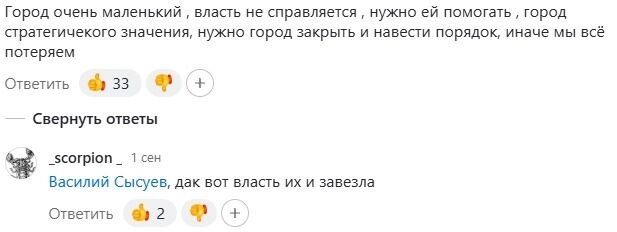

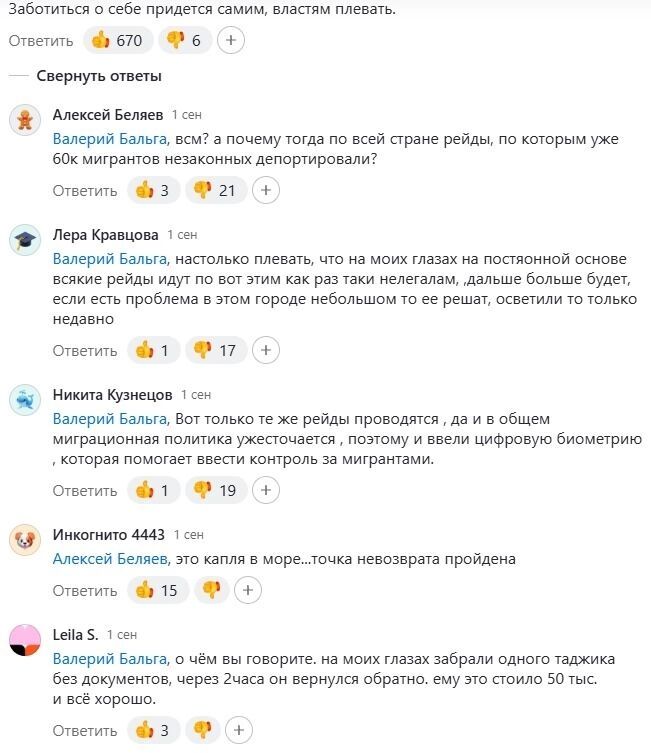
Public discontent is caused by lenient punishments and preventive measures in some high-profile incidents with an ethnic tint. Recent examples include Shchyolkovo, where in one case a crowd of immigrants beat up a football player from the Russian Community (he died a week later), and the instigator left the country. On September 1, a migrant attacked a police officer in Shchyolkovo.
Or a Dagestani, a cadet of the St. Petersburg Police Academy with very interesting publications of a criminal nature on social networks, threatening to cut out a teenager's tongue, cut his throat and cut off "whatever he liked." To intimidate his opponent, he swore by the Koran. The situation was noticed only when the schoolboy was beaten by six people. The cadet was placed under house arrest.
In this case, we are not talking about a migrant, but such behavior and publications on social networks are typical for children of immigrants and young people from other countries who committed crimes in the Russian Federation. Among them were also future law enforcement officers, whose social networks no one paid attention to until it was too late, as in the case of the group murder of a schoolboy in Chelyabinsk .
They published photos in uniform and messages on the topic of thieves. Photo: Toir Dzhalilov
Another illustrative case was the events in Pavlovo, Nizhny Novgorod Region, where a local resident stood up for a girl who was hit by a newcomer for refusing to get acquainted. The young man and his friends first fought with the migrants, and then broke into their dormitory to continue sorting things out. For this, he spent almost a year in a pretrial detention center, and the investigation was frankly delayed. The guy was sentenced to 2.5 years of correctional labor, and the migrant who hit the girl was deported and fined 5 thousand rubles. Many of the participants in the conflict had already gone home by this time.
It is noteworthy that four months after the incident, the head of the migration department in Pavlovo was detained, who, according to local media, allegedly "hushed up" migration violations. She was charged with abuse of office, but by the time the trial began, a case of negligence had already been heard. It did not reach a verdict: after three postponements of the court hearing, the case was closed due to the expiration of the statute of limitations.
All this clearly explains why ethnic crimes and conflicts with migrants have become a sore point for the entire Russian society, and not just for the Khanty-Mansiysk Autonomous Okrug. Incidents with migrants and ethnic coloring are actively discussed on social networks and worry citizens, which has become fertile ground for populism among deputies. In most cases, the initiative of elected representatives stops at the proposal stage or its implementation differs from the original idea.
The same Mironov stated that his party had prepared two bills. The first is about the abolition of work patents and the transition to work permits, which will prevent valuable specialists from moving to Russia with their families. The second is the deportation of the entire relatives of a newcomer in the event of a violation of the law. This is not the first time that the SRZP has introduced such bills. At the same time, media figures, public figures, bloggers and experts have been talking about this for several years, and, judging by the reactions on social networks, these initiatives have broad support.
Other factions are not lagging behind either. But decisions have not been made, despite the harsh rhetoric of various political forces. Here we can recall Bastrykin's words from a year ago.
"Please tell me, what is going on in the State Duma? Is anyone there interested in solving this problem by adopting new laws that correspond to the tense situation?" he asked then.
According to a July poll by Mail.ru , in which more than 20 thousand respondents participated, 83% of Russians support further tightening of migration policy . Let us recall that regional authorities are very limited in this matter.
Still, the process is gradually moving forward, control over newcomers is being strengthened, but what do we have as a result? As reported by State Duma Speaker Vyacheslav Volodin , 21 federal laws in the field of migration have been adopted since 2024. The very first comment under his publication speaks of the inadequacy and belatedness of the measures taken.
Russians' opinions on 21 adopted federal laws in the sphere of migration. Photo: screenshot. Vyacheslav Volodin
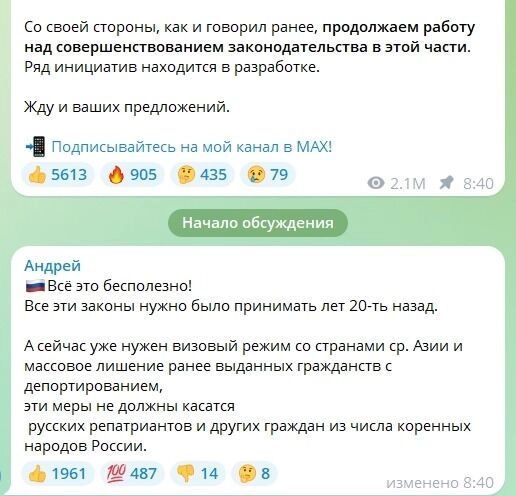
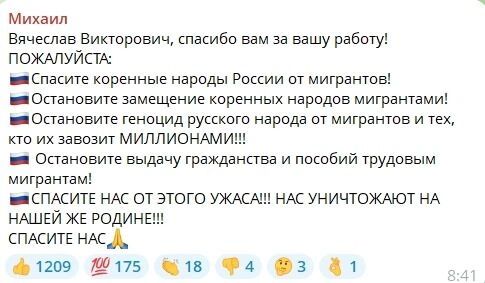

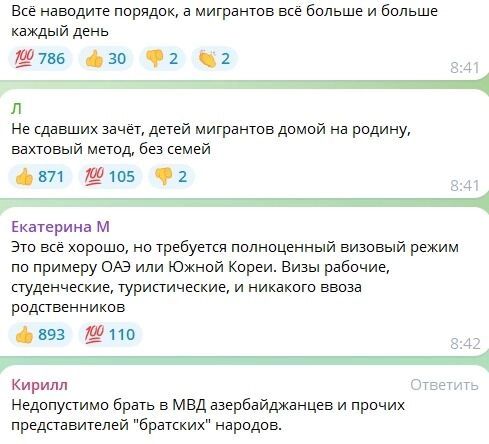
The flow and crime of migrants worry society just as much as they did a year ago, and elected officials are in no hurry to take radical steps, often limiting themselves to rhetoric. So whose fault is it that local residents hear from the lips of newcomers “this is our city” — the regional or federal authorities? Perhaps, in order to make it easier to restore order and not “put out fires,” it would be better not to make a mess?
newizv.ru





